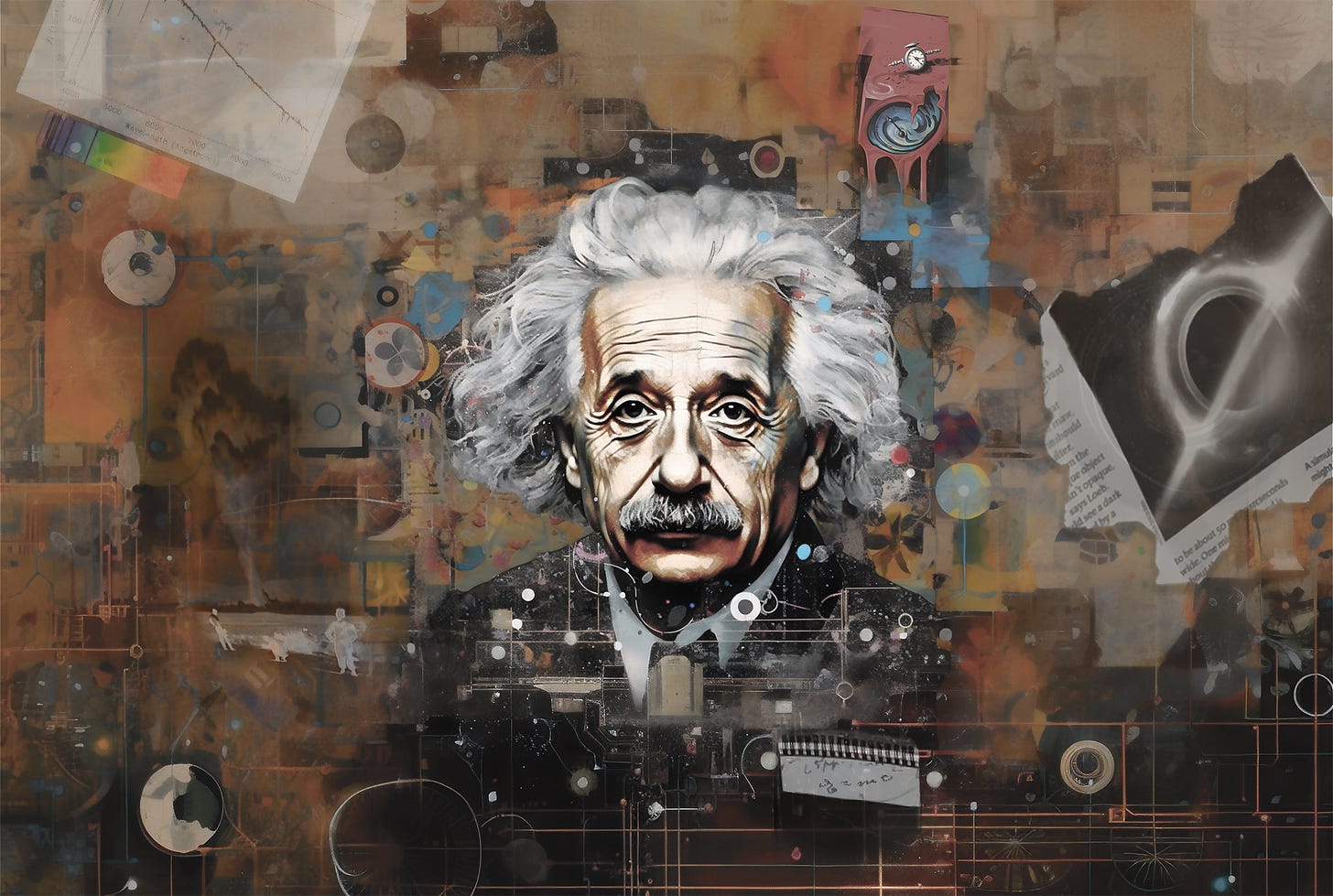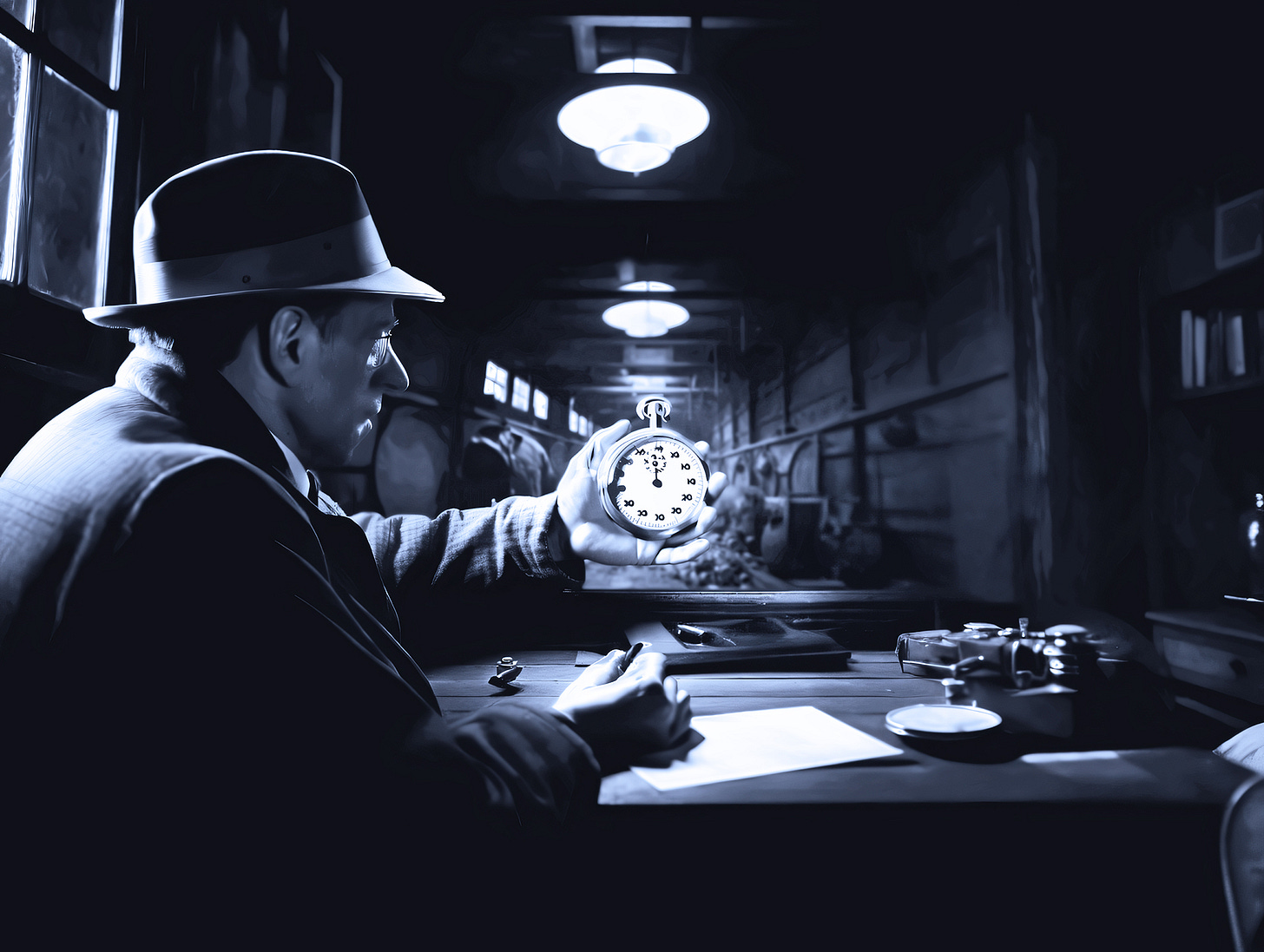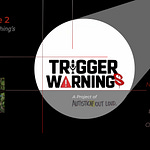
Hey! I’m Johnny Profane… back after a 6-month bout of the "shys" to launch Season 5 of AutisticAF Out Loud.
Missed you guys…
But I'm here now, at least for the moment... Let's do something great with that moment, shall we?
This seems like the perfect occasion to talk about Time… and how it passes. A crucial topic…
whether you’re autistic or ADHD,
wonder if you are,
have kids or a loved one,
work with some,
or work to support us…
I want to give you my experience of autistic time. Which is not chained to clocks or calendars. And different enough from what most folks expect… that I’ve struggled for two years… just to use my words.
So I’ve turned to art. Which is both adult and intense at points…
Some of the images are available as posters. And stick around to the end for a special AI-generated treat. Google's NotebookLM creates a lively dialogue between two AI commentators to break down the key ideas… especially for non-autistics. It's like having digital study buddies to help process all this time-bending stuff!
Every clock is a handgun pointed at my head
III
Every clock is a handgun pointed at my head
Every tick, tick… fucking tick
Tolling Fear, Doom… dread
Click. Slide. Cock… click.
Every night a mantra echoes through my head
TV static… a crazy-making hum
Singing Dream, Drempt… dead…
Not done. Not done. Not done… undone.
10, 9, 8… Dread
7, 6, 5… Fear
4, 3, 2… BEEP.
Shoot the moon… or the country next door
Countdown. Deadline. Bow down… dead.
Bound behind doors, bound in my head
Pace, paces, pacing… paced
Every BEEP.
Of the phone.
Stops…
my heart.
.
.
.
I crash out with a scream for escape
II
Woods
Deep woods
Deepest woods
My ears fly
from bird song
to bird song.
A raptor circles then spirals
Crossing lines now dead
Wind steals my breath
Taking words never said
This skin bag of atmosphere
Breathes new air
When the sun rises
First it is cool
Then it gets warm
The day passes
Clouds above my head.
Shaped by wind
Outside my body
The same wind
Inside my body
The
same
wind
Yet…
I
10, 9, 8… Dread
7, 6, 5… Fear
4, 3, 2… BEEP.
Shoot the moon… or the country next door
Countdown. Deadline. Bow down… dead.
Every clock is a handgun pointed at my head
zero

The Māori must be a wise people. They really get autistic time.
Or at least, Keri Opai did back in 2017. That’s when he coined their new dictionary entry for autism, Takiwātanga, “in his or her own time and space.”
Keri is an author, educator, and social activist. He certainly knew of the Western Medical Model of autism. But… it seems, Keri’s childhood pal, Peter, was autistic. So Keri just could not bring himself to define us as broken.
No medical pathology in Keri’s words. No disabling pity. Rather, respect. Even admiration…
He, and his people, saw what many of us feel. Our deep connection with natural rhythms. Our walk through the world at our own pace. On our own path. Maybe in our own dimensions of time & space.
Takiwātanga. A dictionary definition born out of love. It captures the heart of my autistic life — a different walk through time and space.
Reflecting on Keri's compassionate wisdom… My guess is that the Māoris, at least, are glad we're on the planet. Not because of our needs. Because of our contributions. Rooted in our different perceptions, our outsider experiences.
Let’s dive deeper into Māoris, autism, and our journey through time perception. After this quick word, got bills to pay…
[ad]
This podcast is supported solely by listeners like you. We believe no one should have to pay to be autistic. Which is why we offer all our autistic information for free. To ensure this resource remains available for those who can't afford it, consider choosing a paid subscription at johnnyprofaneknapp.substack.com. Link in the description.
So, maybe the Māoris offer the understanding we autistics need. But Western science still struggles to catch up. Their “Autistic Spectrum”? A laundry list of supposed problems… like “Time Blindness.” Only a problem from an ableist point of view. In an industrialist society.
Problems that might be strengths in a different time, a different place.
Try as I might, I could never measure my time by checking off boxes under “Goals Met.” Like how many widgets I punch out each hour. Which has nothing to do with my quality of life... which is very much wrapped up in the joy of my process.
Why do I want to make you feel how I experience time as an autistic person? How can we understand each other... care for each other... if we don't explore each other?
Why do I use art? Because research trends and terms change with the times... like all things human made. I could wave my hands and quote “neuroplasticity” & “quantum effects” all day and into the night. But that would negate my words in a few years. When the whole research paradigm changes… yet again.
But raw human experience endures.
So… I offer you poetry.
So… I offer you images.
So… I welcome you into my world.
Right up front, every time…
We autistics are not all the same.
Example: Most folks know autistic kids and adults may have sensory differences. What most don’t know? Some of us are not overwhelmed by loud noise, bright lights, big crowds.
Some of us are exhilarated… by them.
And some… like me… experience a bit of both…
So then, what do we share in common as autists? An UN-common sensitivity and reaction to extreme sensory input. Yet, we respond in individual ways… because we’ve lived different lives.
Keep that in mind as I discuss my personal experiences of time, memory… thought. Both research and personal stories show we autists experience time in ways uncommon for most humans.
But each of us experiences time differently. Even as polar opposites.
In My Autistic Time
Want me for dinner? I may bust a gut to please you. AND yet…
I’ll end up mumbling some variation of “I have no freaking clue how so much time could have passed... um, again.”
But get me focused… particularly on my passions… writing or music?
I effortlessly monitor…
fractions of a second...
To hit precisely…
The right hesitation…
of that one… musical note.
Or the perfect combo…
of word choice… and white space…
That.
Makes…
The phrase.
Now, weirdly, any period much longer than a day? All kinda melts together. I can forget to send in a vital Social Security form, thinking, “I just got it yesterday. I still got time…” Weeks later. Months later. Too much later…
Or I might pick up a convo in mid-sentence when I see a friend. From the last time I saw him. Which coulda been two jobs… and a career or so... ago.
Like I have one button on my clock, “NOW.” And for bonus points, its alarm function has no mega-freaking clue…
How long it takes to complete any task invented by any human.
At any time in history.
Or any space we’ve ever occupied.
"Sure, hon, I’ll make dinner tonight! That fake rice-a-roni I make takes 14 minutes to boil. I’ll see ya in about 20.”
One annoyed emoji and an hour later…
🤬
I thumb-type back,
"Oh, my g-d! Never takes this long. Sorry, BRT.”
So, mebbe you think you can help me out with my little schedule problem. Say, give me a time limit? A gentle reminder?
Which makes my brain freeze. Then, my heart follows. Ass remaining firmly implanted in front of some screen or other.
Planning? Keeping commitments? Deadlines?
Family life? Education? Jobs? CAREERS…?
How’m I supposed to pull ANY of those off?
Did I mention there were just two things that almost kept me out of kindergarten? Sure, the “Tying Your Shoes” gotcha. But, omfg, learning to read a clock?
Civilized time requires commitment, plans, deadlines, goals, milestones, and you know, actual production…
Let’s say, I’ve burned through dozens of jobs… average lifespan less than 6 months.
At least 6 careers… average span a year or two.
Marriages… 3. Let’s say, we just don’t go there…
Civilized time is beyond me.
#AutisticAF Out Loud Newsletter is a reader-supported publication. To receive new posts, become a free subscriber. To support my work, consider a paid subscription. To leave a one-time tip of any amount, please visit Ko-Fi.

Why? Let’s Explore Autistic Dark Time…
Einstein broke the news. Time is relative. For all of us. He said time is a measure of the curvature of space-time between two events… basically. Different in different places, depending on how fast you’re moving at the time…
Physics says, he’s right.
So far.
At least if you’re bigger than an atom.
Most places…
That we know about…

And it seems as if most humans who I know, in their own way also measure time by events. What happened. How often. How much a month is this gonna cost me...?
But my autistic time isn’t a measure of events and the distances between them. I measure the depth of feeling and its quality as those events unfold. From highs to lows. From joy... to pain.
It’s like most humans experience time and space the way Newton or Einstein would. According to elegant rules… in precisely measurable dimensions…filled with matter, energy, and consumable products.
Doesn’t matter how you measure it. Either Imperial OR metric units make equal sense…if you’re punching out widgets.
With guys carrying stopwatches hovering and lurking in the shadows… counting your pieces per hour.
Every bit of that modern industrial world makes sense… in that scene.
Convenience packaging.
Fast food.
Microwaves...
Low monthly payments.
Superhighways.
This season's fashions.
Time-limited sales.
Slip on shoes.
No-iron shirts.
“Skip ad” buttons…
But me? I’m stuck in some quantum world with weird dimensions… like “spin” & “charm”... Things you cannot count on the factory floor.
It could be that Joy quarks ... like Light quarks… can be waves or they may be particles. But they certainly disappear if you observe them too closely…

Time doesn’t flow smoothly for me.
It’s more like waves and troughs.
If I’m interested in what you’re saying, what I’m reading… hours fly by. In fact, if I’m really into my passion… painting, cooking, whatev… time has no meaning. I’m outside of time. In a place indistinguishable from… Joy.
But boredom?
A slow, annoying
hands-and-knees crawl
across wooden schoolroom floor boards…
taking secret, furtive over-the-shoulder glances
at a second hand
stubbornly
sweeping.
So, depression, anxiety… DEADLINES? They grind out, second by agonizing second, in my gut.
My very definition of… Dread.
Now, shoehorn my autistic experience into your punchclock world.
I'm autistic. Pretty sure ADHD, too. In my 70s, every ticking second is a countdown to some duty, obligation, deadline... death…
No. That's a lie.
Reality?
Hours of numbness... obsessively flicking through screens... frightened to look away and notice the time of day... the season.
Leading to days of dull semi-awareness... punctuated by trips to the bathroom. Between delivered pizzas.
And moments of terror when despite my best dim-witted efforts, I see 9:27 out of the corner of my eye. And the sun screams,
"Hey, it's morning. You gotta get going. You got stuff to do."
Or maybe it's 3:19 am. So the moon shames me with,
"Well, there goes another day you didn't meet expectations."
Every timepiece I can remember was like a prison guard's gun... the real power enforcing order.
The calendar that told the doctor that 2 weeks late is too long... so he forced my delivery with forceps.
Or the school bell that announced precisely when I must be silent... or pee.
The alarms shrieking at the factory door.
Time clocks measuring the distance to starvation.
Calendars counting days til the next vacation, back to school, parental promotion... and move to a new town.
Report cards.
Bank clocks, clock towers and multiple-choice tests… all counting down seconds to disaster.
Procrastination… The Black Hole I Hide in
Let me take you into a moment that captures the essence of my struggle with time. Circling around a pizza… that American Icon of Hurry-Up-and-Wait Fast Food Frenzy…
"Where's the waitress...???"
I glance at the watch on my wrist. Again. A plaintive cry in my head…
"That paper was due a WEEK ago..."
I'm sitting in a pizza joint. On an old-skool tubular steel and fiberglass chair. Dirty, glaringly orange, butt killer. The kind grade schools stacked against walls... back before Kennedy was shot.
"Fuck. I wanted a pizza cuz it thought it'd be fast..."
I'm checking the clock robotically every few minutes. It's like 9 at night. The grad school prof believed in me. He knew I needed an A for my GPA. Promised he wouldn't mark me down for lateness. IF it was my usual quality. AND I get my 10 pages in…
“Before class. Tomorrow. 10 am.” Tapping his watch. “No excuses.”
I had a great topic… "Challenges of Cognitive Therapy for Middle-Old Senior Clients." BUT I couldn't make it come. Hadn't even started. I paced for hours in my apartment. Nothing. Zip. NADA.
So, my bright idea?
“I know, walk the 4 blocks and grab a quick slice. Kill two birds. Get my blood pumping. Get dinner outta the way. I’ll write all night if I gotta… When I get home.”
An hour and a half later, after waitress delays, problems with the credit card, bumping into that classmate I couldn’t duck… As I trudge home on drizzly Albany streets, my new plan…?
“Um, I’ll get up at 5 am. Pump out a page an hour… He’ll still take it… if I skate into class at the last minute.”
Right. Couple weeks later… I get The Letter.
…after careful consideration by the full Committee…. blah-blah-blah-de-blah-BLAH…. Effective immediately withdrawn from the Graduate program and cease issuing your stipend.
But… Pizza? Save time? Prioritize?! Every link in my logic made so much sense… at the Time. It always does. Til I look back. And feel stupid.
I can never be certain of any commitment I make… no matter how heavily they weigh on me. Even ones that kill paychecks. Kill careers. Destroy marriages.
Even the most dear ones that I make to myself. My dreams.
How much does a dream weigh?
Enough to slump shoulders apparently.
And strangely? Even more as they die…
The Spin-Charm of My Emotional Experience
But out of this Time Stream Meltdown chaos, I glimpse a different way of being. A rhythm more in tune with my Autistic+ADHD nature.
See, this is what I’ve come to believe. Time-centered agony is not my natural state. Not in the environment I was built for… the Pre-Industrial… In the life I was designed to live… before Henry Ford’s punch clock…
Because in the world I was born for
you don't need a watch, an alarm, a daily planner
not even a Bible, self-help book… or scholar’s study
to know
when the sun rises
when to eat
when to pee
when to pick berries on the fence row
when the sun sets
when to sleep.
My natural state is this…
When the sun rises
First it is cool
Then it gets warm
The day passes
Clouds above my head.
Shaped by wind
Outside my body
The same wind
Inside my body
The
same
wind
Out of the Blue… and into the Black… Data
From my lived experience to the lab: What does Science say about autistic time?
I only know my personal experience. So it seems only fair... I must give you highlights of current research on autistic and neurodivergent time. Notes in “References and Further Reading” in the description.
Research on time perception in autistic individuals shows mixed results. Some studies show autistic differences. Some don’t. Particularly when it comes to complex tasks. But the complexity of the task may influence time perception differences.
A study in 2022 found there were no notable differences for autistic adults. At least not in interval and event timing judgments. This challenges the notion that autistic individuals sense time differently.
Research suggests autistic folks may struggle synchronizing the passage of time. When matching visual and auditory stimuli.
Encyclopedic Overview. The article "Time Experience in Autism Spectrum Disorder" discusses theories of time perception in autism.
Controversial Sources. Note that sources like Autism Speaks are controversial in the neurodiversity community. Their research is included for completeness. But perhaps be cautious.
So after trying to use my words for 2 years…to just explain...
Word after word after sentence after paragraph after page… utterly failing to strike at the heart of they call my Time Blindness, my Time Trauma, or what I focus on… my Time Joy…
I offer you simply this…
My art.
I have no agenda. I have no tips to give you. So I offer my life… Take what you can use. And leave the rest.
Time’s short. And it moves in one direction. Always shorter.
Outro
Funny how time works – 7 decades in, and my autistic experience keeps evolving. Variable ability? It's a whole new ballgame in your golden years. Not just about skills anymore – it's about navigating each day's random landscape. Joy and autism, they're still my constant companions, even if they wear different masks now. Stay tuned – I've got more to share about this wild ride through time.
Google NotebookLM Podcast Summary
Hey everyone, welcome back for another deep dive. Hi. There are you ready to explore the experience of time itself? I'm intrigued because we were diving into your source material today, going deep into excerpts from pasted text. Specifically, we're looking at a podcast transcript called every clock is a handgun in my autistic time, by Johnny profane. And let me tell you, profane who identifies as both autistic and ADHD, really doesn't hold back. Trust me, this deep dive is about way more than just autism. It makes us think about everything we think we know about what time even is. Wow. Yeah, it's a fascinating one. And to help unpack the science and the wider implications of profanes experiences, we're joined by, well, an expert in, well, you could say neuroscience, but really in the experience of time itself. Happy to be here. Thanks for joining us. Let's dive right in. So profane starts off with this really powerful metaphor. You know, he says every clock is a handgun pointed at my head. It's such a visceral image. It is, it is like it really gets under your skin, yeah, and he's really talking about that, that feeling of dread, you know that we often kind of associate with deadlines and obligations, that constant pressure of time just measured out in seconds and minutes and hours, palpable, that anxiety just in those words, right? But then profane contrasts this with something totally different when he feels outside of time, totally immersed in joy and flow interesting, almost like what we call a flow state, right? Yeah, yeah, exactly. The feeling of being so engrossed in something that you lose track of everything else, right, time just fades away. And while lots of people experience these flow states, they can be especially intense for neurodivergent individuals. Yeah, and profane actually gives a really relatable example. He talks about struggling with deadlines like this 10 page paper he had to write, and how frustrating it was for both him and the people around him. Sounds like a classic example of what many people with ADHD and autism experience, time blindness, right? A very real struggle to accurately estimate how long tasks will take. And I think it's interesting how profane brings in this Maori concept of takawatanga, meaning in his or her own time and space. It is such a powerful concept, yeah, because it's not just a definition, right? It's a completely different way of looking at neurodiversity as a different way of being, not a deficit. And this idea of takiwa Tonga makes you realize how often we impose our sense of time on others, right, especially in work or school, absolutely. And it begs the question, what if we embraced a more flexible approach, yeah, one that recognizes different rhythms and ways of working. Could that be beneficial for everyone? And this is where things get even more interesting, you know, because profane doesn't just rely on his personal experiences. He actually, like goes into the actual science of autistic time perception, right? Which I thought was really interesting, yeah, he does mention that, you know, the research is still developing, and it can be kind of contradictory, of course, yeah, which is important to keep in mind, right, as we sort of explore this a little bit further. Yeah, it's a complex field, and there's still a lot we're learning about how our brains perceive time. For example, you know, some studies using EEG have shown that autistic individuals, they might process temporal information differently, like, at a neural level, it's like their internal clock is, like wired a bit differently, in a way, yeah. But then, like, profane points out, there are other studies, behavioral studies using tasks like time reproduction and those Haven't you know, consistently found these clear differences between, you know, autistic and non autistic individuals, so it's Yeah, so how do we make sense of that, right? When it seems like those are kind of contradictory findings, right? Well, that's the thing about scientific research, yeah, it's not always a straight line to the answer, right, right, right? So instead of seeing them as contradictions, maybe these findings highlight just how complex the experience of time really is, okay, and it's probably influenced by a whole bunch of factors, both individual and contextual, which makes it a really personal experience. When you think about it, it really makes you kind of go back and think, Huh, you know, maybe we take a lot for granted, yeah? And we're talking about something like time, right? Yeah, which, I guess, leads to the big question, right? Like, why does any of this even matter for those of us listening who, you know, maybe aren't autistic, haven't had that, you know, direct experience with autism, I think that's such an important point to bring up, because one of the biggest takeaways here is, you know, I think it's empathy, yeah, when we really try to understand how other people experience the world differently, even something, you know, as basic as time, yeah, it allows us to connect on this whole other level, yeah, yeah, like we're stepping outside of ourselves for a minute, exactly, seeing things through someone else's eyes, right? And I think, you know, profanes experiences really challenge us. Yeah?
#AutisticAF Out Loud Newsletter is a reader-supported publication. To receive new posts and support my work, consider becoming a free or paid subscriber. To leave a one-time tip of any amount, please visit Ko-Fi.
Key Takeaways (summary by Perplexity)
Time Perception and Anxiety The poem vividly depicts the intense anxiety many autistic individuals experience around time and deadlines. Lines like "Every clock is a handgun pointed at my head" and the countdown sequence illustrate how time pressure can feel threatening and overwhelming. For many autistic people, difficulties with time perception and executive functioning can make deadlines and time management extremely stressful. The ticking clock becomes a source of dread rather than a neutral tool.
Sensory Sensitivities The poem references sensory experiences like "TV static" and a "crazy-making hum", highlighting how autistic individuals often have heightened sensory sensitivities. Sounds or stimuli that may not bother others can be intensely distracting or distressing.
Need for Nature and Sensory Regulation The second part of the poem describes being in nature, with vivid sensory details about birds, wind, and clouds. Many autistic people find nature soothing and use it for sensory regulation and stress relief. The contrast between the anxious first section and calmer nature section illustrates this.
Internal Experience vs. External Pressures The poem juxtaposes the speaker's internal sensory world with external pressures like deadlines. This reflects how autistic individuals often experience a disconnect between their internal experiences and external expectations.
Difficulty with Change and Transitions The abrupt shifts between sections and the countdown sequences may represent the challenges many autistic people face with changes and transitions. Moving between different mental states or environments can be jarring.
Intense Emotions and Experiences The vivid, intense language throughout the poem reflects how many autistic individuals experience emotions and sensations very intensely. What may seem minor to others can feel overwhelming. In summary, this poem powerfully conveys common autistic experiences around time perception, anxiety, sensory sensitivities, and the contrast between internal experiences and external pressures. It highlights the intense and often overwhelming nature of these experiences for many autistic individuals.
References & Further Reading:
Neither exhaustive nor comprehensive. Articles that made me think.
1. Autism Research - Systematic Review
https://www.ncbi.nlm.nih.gov/pmc/articles/PMC6852160/
2. APA - Time Perception Study 2022
https://psycnet.apa.org/record/2022-55325-001
3. Spectrum News - Time Perception
https://www.spectrumnews.org/news/time-perception-problems-may-explain-autism-symptoms/
4. Encyclopedia of Autism Spectrum Disorders - Time Experience
https://link.springer.com/10.1007/978-1-4614-6435-8_102354-1
5. Spectrum News - Time is a Slippery Concept(https://www.spectrumnews.org/opinion/for-people-with-autism-time-is-slippery-concept/
6. PubMed - Study on Complex Tasks
https://pubmed.ncbi.nlm.nih.gov/31336032/
7. Wiley Online Library - Research Article
https://onlinelibrary.wiley.com/doi/abs/10.1002/aur.2170
#AutisticAF Out Loud Newsletter is a reader-supported publication. To receive new posts and support my work, consider becoming a free or paid subscriber. To leave a one-time tip of any amount, please visit Ko-Fi.


















Share this post